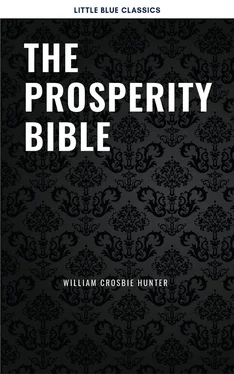She had a good sense of humor and commenced immediately, putting her house in order. She rearranged furniture, straightened out bureau drawers, cleaned rugs, and soon made a big financial demonstration – a gift from a relative. The woman, herself, became made over, and keeps herself keyed-up financially, by being ever watchful of the external and expecting prosperity, knowing God is her supply.
Many people are in ignorance of the fact that gifts and things are investments, and that hoarding and saving invariably lead to loss.
"There is that scattereth and yet increaseth; and there is that withholdeth more than is meet, but it tendeth to poverty."
For example: I knew a man who wanted to buy a fur-lined overcoat. He and his wife went to various shops, but there was none he wanted. He said they were all too cheap- looking. At last, he was shown one, the salesman said was valued at a thousand dollars, but which the manager would sell him for five-hundred dollars, as it was late in the season.
His financial possessions amounted to about seven hundred dollars. The reasoning mind would have said, "You can't afford to spend nearly all you have on a coat," but he was very intuitive and never reasoned.
He turned to his wife and said, "If I get this coat, I'll make a ton of money!" So his wife consented, weakly.
About a month later, he received a ten-thousand-dollar commission. The coat made him feel so rich, it linked him with success and prosperity; without the coat he would not have received the commission. It was an investment paying large dividends!
If man ignores these leadings to spend or to give, the same amount of money will go in an uninteresting or unhappy way.
For example: A woman told me, on Thanksgiving Day, she informed her family that they could not afford a Thanksgiving dinner. She had the money, but decided to save it.
A few days later, someone entered her room and took from the bureau drawer the exact amount the dinner would have cost.
The law always stands back of the man who spends fearlessly, with wisdom.
For example: One of my students was shopping with her little nephew. The child clamored for a toy, which she told him she could not afford to buy.
She realized suddenly that she was seeking lack, and not recognizing God as her supply!
So she bought the toy, and on her way home, picked up, in the street, the exact amount of money she had paid for it.
Man's supply is inexhaustible and unfailing when fully trusted, but faith or trust must precede the demonstration. "According to your faith be it unto you." "Faith is the substance of things hoped for, the evidence of things not seen – " for faith holds the vision steady, and the adverse pictures are dissolved and dissipated, and "in due season we shall reap, if we faint not."
Jesus Christ brought the good news (the gospel) that there was a higher law than the law of Karma – and that that law transcends the law of Karma. It is the law of grace, or forgiveness. It is the law which frees man from the law of cause and effect – the law of consequence. "Under grace, and not under law."
We are told that on this plane, man reaps where he has not sown; the gifts of God are simply poured out upon him. "All that the Kingdom affords is his." This continued state of bliss awaits the man who has overcome the race (or world) thought.
In the world thought there is tribulation, but Jesus Christ said: "Be of good cheer; I have overcome the world."
The world thought is that of sin, sickness and death. He saw their absolute unreality and said sickness and sorrow shall pass away and death itself, the last enemy, be overcome.
We know now, from a scientific standpoint, that death could be overcome by stamping the subconscious mind with the conviction of eternal youth and eternal life.
The subconscious, being simply power without direction, carries out orders without questioning.
Working under the direction of the superconscious (the Christ or God within man) the "resurrection of the body" would be accomplished.
Man would no longer throw off his body in death, it would be transformed into the "body electric," sung by Walt Whitman, for Christianity is founded upon the forgiveness of sins and "an empty tomb."
6
CASTING THE BURDEN IMPRESSING THE SUBCONSCIOUS
When man knows his own powers and the workings of his mind, his great desire is to find an easy and quick way to impress the subconscious with good, for simply an intellectual knowledge of the Truth will not bring results.
In my own case, I found the easiest way is in "casting the burden."
A metaphysician once explained it in this manner. He said, "The only thing which gives anything weight in nature, is the law of gravitation, and if a boulder could be taken high above the planet, there would be no weight in that boulder; and that is what Jesus Christ meant when he said: "My yoke is easy and my burden is light."
He had overcome the world vibration, and functioned in the fourth dimensional realm, where there is only perfection, completion, life and joy.
He said: "Come to me all ye that are labor and are heavy laden, and I will give you rest." "Take my yoke upon you, for my yoke is easy and my burden is light."
We are also told in the fifty-fifth Psalm, to "cast thy burden upon the Lord." Many passages in the Bible state that the battle is God's not man's and that man is always to "stand still" and see the Salvation of the Lord.
This indicates that the superconscious mind (or Christ within) is the department which fights man's battle and relieves him of burdens.
We see, therefore, that man violates law if he carries a burden, and a burden is an adverse thought or condition, and this thought or condition has its root in the subconscious.
It seems almost impossible to make any headway directing the subconscious from the conscious, or reasoning mind, as the reasoning mind (the intellect) is limited in its conceptions, and filled with doubts and fears.
How scientific it then is, to cast the burden upon the superconscious mind (or Christ within) where it is "made light," or dissolved into its native nothingness."
For example: A woman in urgent need of money, "made light" upon the Christ within, the superconscious, with the statement, "I cast this burden of lack on the Christ (within) and I go free to have plenty!"
The belief in lack was her burden, and as she cast it upon the Superconscious with its belief of plenty, an avalanche of supply was the result.
We read, "The Christ in you the hope of glory."
Another example: One of my students had been given a new piano, and there was no room in her studio for it until she had moved out the old one. She was in a state of perplexity. She wanted to keep the old piano, but knew of no place to send it. She became desperate, as the new piano was to be sent immediately; in fact, was on its way, with no place to put it. She said it came to her to repeat, "I cast this burden on the Christ within, and I go free."
A few moments later, her 'phone rang, and a woman friend asked if she might rent her old piano, and it was moved out, a few minutes before the new one arrived.
I knew a woman, whose burden was resentment. She said, "I cast this burden of resentment on the Christ within, and I go free, to be loving, harmonious and happy." The Almighty superconscious, flooded the subconscious with love, and her whole life was changed. For years, resentment had held her in a state of torment and imprisoned her sould (the subconscious mind).
The statement should be made over and over and over, sometimes for hours at a time, silently or audibly, with quietness but determination.
I have often compared it to winding-up a victrola. We must wind ourselves up with spoken words.
Читать дальше












